 Petzlover
Petzlover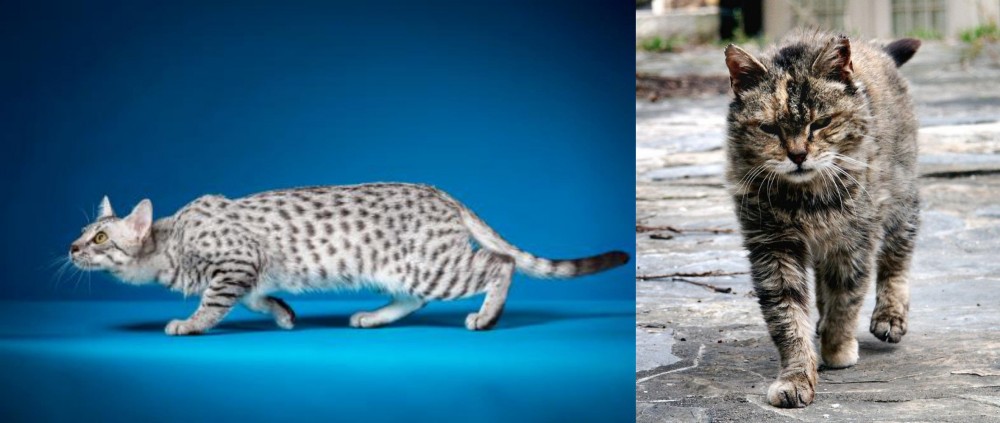 Egyptian Mau is originated from Egypt but Farm Cat is originated from United States. Both Egyptian Mau and Farm Cat are having almost same weight. Egyptian Mau may live 5 years less than Farm Cat. Both Egyptian Mau and Farm Cat has same litter size. Egyptian Mau requires Low Maintenance. But Farm Cat requires Moderate Maintenance
Egyptian Mau is originated from Egypt but Farm Cat is originated from United States. Both Egyptian Mau and Farm Cat are having almost same weight. Egyptian Mau may live 5 years less than Farm Cat. Both Egyptian Mau and Farm Cat has same litter size. Egyptian Mau requires Low Maintenance. But Farm Cat requires Moderate Maintenance
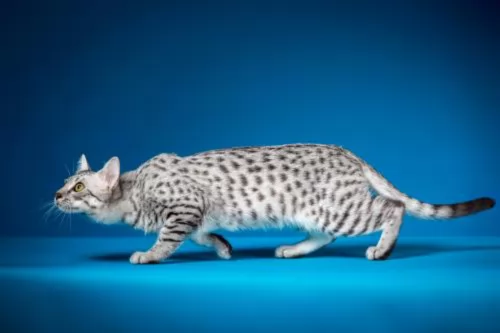 The Egyptians have always been interested in cats, and it is believed that in 1953 a noblewoman left Egypt with a tabby cat, returning to Italy.
The Egyptians have always been interested in cats, and it is believed that in 1953 a noblewoman left Egypt with a tabby cat, returning to Italy.
Later, another cat was also brought to Italy and the pair were mated. The Egyptian Mau is a natural breed.
In 1956, a kitten of the pair was brought to the United States and the Egyptian Mau was developed. A breeding program was started in the United States. The breed Egyptian Mau was recognized in 1958 in the United States and 1992 in Europe.
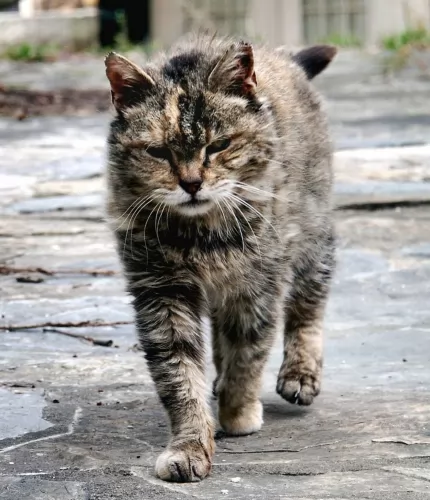 Known also as the Barn Cat, this domestic cat is of a mixed breed. The very name ‘farm cat’ is referring to a general kind of cat that lives in an almost wild state on farms and agricultural properties.
Known also as the Barn Cat, this domestic cat is of a mixed breed. The very name ‘farm cat’ is referring to a general kind of cat that lives in an almost wild state on farms and agricultural properties.
Possibly, their role in keeping rodents at bay was how they came about – domesticated to keep rodents away from grain crops.
When you do research you find that there is archeological evidence to suggests that these farm cats have been around since about 7500 BC. Most barn cats fall under the domestic shorthair or domestic longhair categories.
These cats live in a variety of conditions and some of them get their food solely from the rodents they catch. Others are tame with access to supplemental cat food as well as veterinary care.
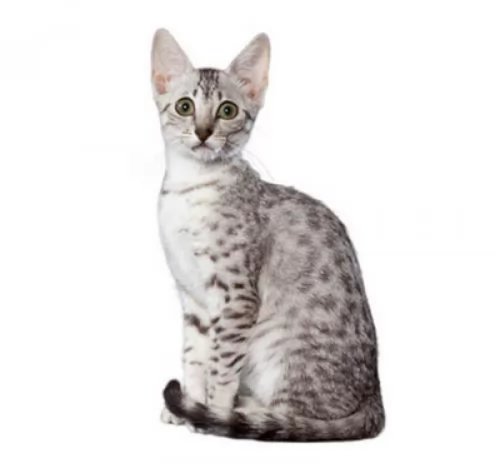 This is a medium-sized, long, athletic cat that is well muscled. It weighs between 3 to 5kg. The Mau is heavily muscled and strong. It has a triangular-shaped head with large almond-shaped eyes.
This is a medium-sized, long, athletic cat that is well muscled. It weighs between 3 to 5kg. The Mau is heavily muscled and strong. It has a triangular-shaped head with large almond-shaped eyes.
The coat of the Mau is medium in length and is glossy and soft. There are spots on the coat but the cat is particularly well known for the dark stripe that runs from its head to its tail. The coat comes in several different colors such as silver, black, tan and blue. All Maus have green eyes.
These cats are known for being loyal and friendly and they love warm weather and enjoying a spot in the sun.
They are talkative cats too and also love to sit on high perches and survey the world from these high positions. They are excellent climbers and you’ll need to supply these cats with a climbing tree. Its an intelligent breed and he will get along well with children in the home as well as be friendly towards other pets.
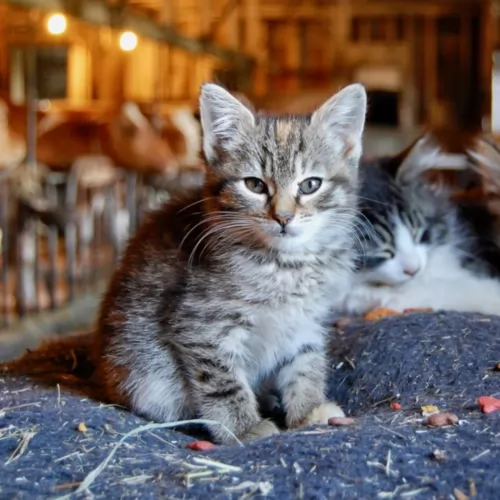 Farms cats are also members of domestic cats but it’s just that they are usually not socialized and they run away from people.
Farms cats are also members of domestic cats but it’s just that they are usually not socialized and they run away from people.
Farm cats have different histories and there is really no one-size-fits-all description of them.
They can weigh anything from 2 to 8kg. They can live to be anything between 10 and 20 years of age. Some of them are large, some small, some are solid colored while others are bi-colored and patterned. Their coats differ too and you can find short- and long-haired varieties among your farm cats
Their eyes and ears will also be in any shades and sizes and these cats are usually not spayed or neutered and can produce kittens that nobody is sure how they’ll turn out.
If you were to stumble across a farm cat born of unknown parents, there is no knowing what the small feline will behave like. Socialization and lifestyle play a big role in determining how a kitten will turn out but farm cats left to their own devices could be quiet, aggressive, loving, naughty, reticent, reserved, playful, lazy, shy or nervous.
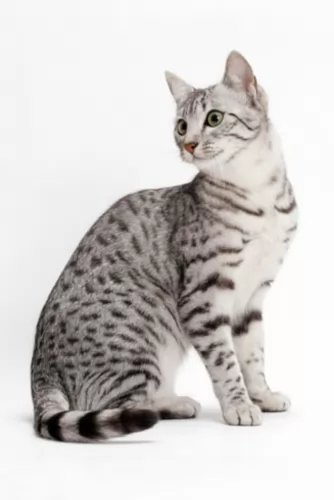 These are social cats with their own human family but the Egyptian Mau does tend to be a bit reserved around strangers.
These are social cats with their own human family but the Egyptian Mau does tend to be a bit reserved around strangers.
They make excellent pets and companions and if he is happy, you’ll hear him making little noises to express his contentment.
What also makes him so attractive as a pet is that he is a short-coated cat that is considered to be low maintenance.
Before you decide to take on any animal as a pet and before you bring the Egyptian Mau into your home, do thorough research on this rare cat breed. If you do decide to take him in, find out all you can on how to provide for him so that he receives the best care and love in your home.
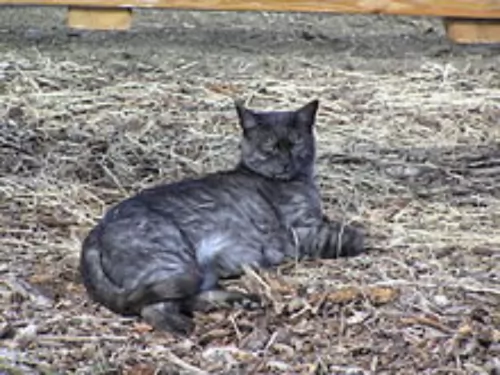 Farm cats are such wonderful animals – they just need a good chance in life like other domestic cats.
Farm cats are such wonderful animals – they just need a good chance in life like other domestic cats.
Many of them have had a hard life and it can be marvelous to open your home and heart to one or two of them and see the pleasure they bring.
They’re full of character and if you provide them with good food and a warm bed and promise to love them, you’ll no doubt be starting a solid and meaningful friendship that can enhance your life.
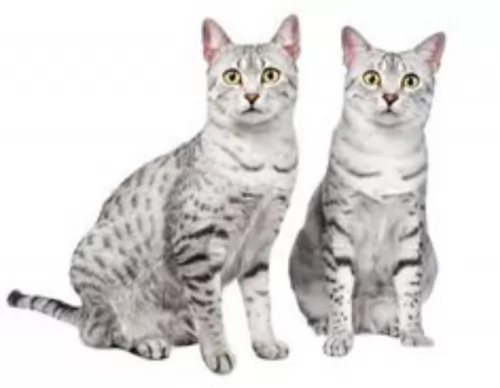 Egyptian Maus are strong, robust cats and they don't have any particular health problems.
Egyptian Maus are strong, robust cats and they don't have any particular health problems.
Obesity is a major disease with this cat and all other cats and it's worth noting, as obesity contributes to a great number of illnesses in cats. Excess weight can lead to diabetes and arthritis and well as other life-threatening diseases.
Two things that play an important role in his health are ensuring that he has access to excellent, nutritious, meaty food, as cats are carnivores.
You also want to ensure that he gets all his vaccines and de-wormings. If you notice that your cat seems to be under the weather, get him to the vet as soon as possible.
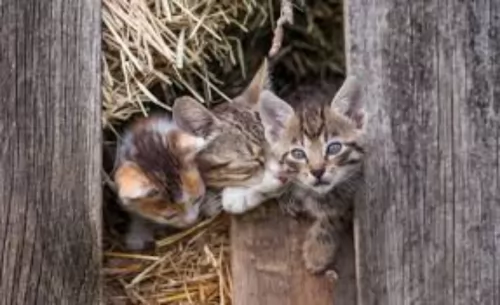 Farm cats left to fend for themselves can suffer from a host of illnesses. Eye infections are one. The cause of these eye infections is usually a virus, of which herpes, chlamydia, and Calicivirus are the most common.
Farm cats left to fend for themselves can suffer from a host of illnesses. Eye infections are one. The cause of these eye infections is usually a virus, of which herpes, chlamydia, and Calicivirus are the most common.
Your vet will certainly prescribe you some antibiotics for your kitten to help against secondary infections.
Check your farm kitten over as he is likely to have a nose full of snot as well and may even be sneezing. Take the kitten to the vet who can give him a good once-over and put him on the road to recovery.
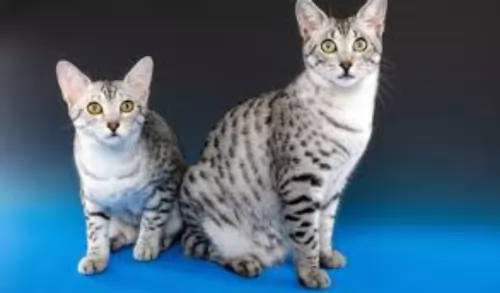 The beautiful coat of the Egyptian Mau is easy to care for and a weekly brushing will ensure it stays shiny and healthy.
The beautiful coat of the Egyptian Mau is easy to care for and a weekly brushing will ensure it stays shiny and healthy.
If he will let you, try to look inside his mouth to ensure the teeth and gums are healthy.
Remember, if there are any grooming activities for this cat that you feel you can’t cope with, professional groomers will do it for you.
Provide your Egyptian Mau with a climbing tree and scratching post as the cat loves to jump and climb.
He is an active, intelligent cat and needs to be stimulated with exciting toys, particularly when you’re not around to entertain him.
Cats such as the Egyptian Mau are clean and they want their litterbox to be kept clean. Invest in scoop and rake and rid the litter box every day of cat droppings. There also comes a time when you will have to replace all the sand or grit as well.
It will be fantastic if you can provide this cat with a water fountain and a type of pool as they love playing in water.
Make sure your Mau has constant access to fresh, cool drinking water.
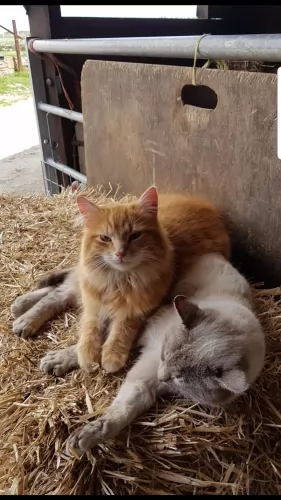 Barn cats or farm cats are not likely to have been neutered or spayed and they are just adding to the overpopulation of farm cats that can become feral cats.
Barn cats or farm cats are not likely to have been neutered or spayed and they are just adding to the overpopulation of farm cats that can become feral cats.
The average fertile cat can produce three litters every year, and with as many as 6 kittens in a litter, you can imagine how a small colony of cats can get out of control.
Sometimes cat rescue programs do a steri-drive and spay and neuter cats like this to curb the numbers. Of course, spaying and neutering can prevent many diseases as well.
If you have farm cats that have been spayed or neutered, provide them with good food and water. You can put out wet, canned cat food or dry kibble – they’ll be so pleased as most times these cats don’t even know where their next meal will come from.
You see them drinking out of puddles of water. Unfortunately, these pools are often filled with contaminants and this can also make the cats sick.
Every cat just wants a soft, warm place to sleep, and if you can, provide some warm dry hay for these farm cats. Even a cardboard box can be a haven for a cat that has never known a bed.
If you have managed to catch a farm cat kitten and you want to offer it a home, make sure to start off with veterinary care and vaccines.